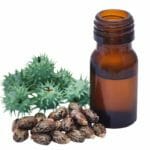How long can you leave rosemary oil in your hair?
At BeautyCaters, our expert team independently curates every recommended product. Purchases through our links may earn us a commission. Explore our transparent selection process.
You’ve jumped on the rosemary oil bandwagon and want to give your hair some love? Great choice! But how long can you leave rosemary oil in your hair? Too little time, and you might not see results. Too much, and your scalp could freak out. So, let’s figure out the perfect amount of rosemary oil and the ideal timeframe for maximizing it’s benefits without compromising your hair health.
- How does rosemary oil work on your hair?
- 9 benefits of rosemary oil on hair
- Potential side effects of rosemary oil
- How to use rosemary oil on your scalp?
- Rosemary oil application duration for different hair types
- Can I leave rosemary oil on hair throughout the day?
- Can I leave rosemary oil in hair overnight?
- What happens if I don’t wash rosemary oil out of hair?
- How long should you use rosemary oil?
- Can excessive rosemary oil damage your hair?
- Can you use rosemary oil for hair loss?
- When to avoid using rosemary oil on hair?
- Final Word: How long can you leave rosemary oil in your hair?

How does rosemary oil work on your hair?
Rosemary oil has gained popularity as a natural remedy for various hair concerns. But how does this aromatic oil actually benefit your scalp and hair? The oil is believed to be a natural DHT blocker, this essential oil can potentially combat hair loss. By inhibiting dihydrotestosterone (DHT) a hormone linked to hair loss, rosemary oil may help slow down hair thinning and encourage new growth.
9 benefits of rosemary oil on hair
Rosemary oil has emerged as a potential solution for various hair concerns. Its properties offer several potential advantages for hair health:
- A stress reliever: Rosemary oil offers more than just hair benefits. Its calming aroma can help reduce stress and anxiety. Studies have shown that inhaling rosemary oil can lower cortisol levels, the stress hormone. This relaxation can indirectly benefit hair health by reducing stress-related hair issues.
- Hair growth: Rosemary oil has shown promise as a natural approach to combatting hair loss. Research has indicated that rosemary oil may stimulate hair growth by improving blood circulation to the scalp and potentially inhibiting DHT, a hormone linked to hair thinning. Furthermore, it have found more effective to Minoxidil, a commonly prescribed medication. While Minoxidil can have side effects like scalp irritation and increased heart rate, rosemary oil offers a potentially gentler alternative.
- Scalp health: Rosemary oil’s natural antimicrobial properties make it an effective cleanser for the scalp. Regular use can help maintain a healthy scalp environment by neutralizing bacteria and reducing buildup. This can contribute to cleaner free of itchiness, and scalp infections.
- Hair strengthening: Rosemary oil can contribute to thicker, stronger hair by stimulating blood flow to the scalp. Increased circulation delivers essential nutrients and oxygen to hair follicles, promoting hair growth and overall hair health.
- Potential for hair darkening: While primarily known for its hair growth benefits, rosemary oil may also influence hair color. Some believe it can help darken graying hair. While scientific evidence is limited, anecdotal reports suggest that rosemary oil’s properties might contribute to restoring natural hair pigmentation. Combining it with other herbs like sage could potentially enhance this effect.
- Soothes scalp: Rosemary oil offers relief from an itchy scalp, a common issue often associated with hair loss treatments. Its anti-inflammatory properties help calm irritation, while its antifungal qualities contribute to a healthier scalp environment. Studies have shown that rosemary oil can improve scalp hydration and elasticity, further promoting scalp health.
- Boost blood circulation: Rosemary oil can stimulate blood flow to the scalp. This increased circulation is crucial for hair growth as it delivers essential nutrients and oxygen to hair follicles. Studies have shown that rosemary oil can improve blood flow both through topical application and inhalation.
- A potential hair loss solution: Rosemary oil has shown promise in combating hair loss. By inhibiting dihydrotestosterone (DHT), a hormone linked to hair thinning, rosemary oil may help slow down hair loss and potentially encourage regrowth. A healthy scalp environment, promoted by rosemary oil’s properties, is crucial in preventing hair loss.
- Treat dandruff: Rosemary oil offers a potential natural remedy to dandruff. Its anti-inflammatory and antimicrobial properties help combat the bacteria and fungus that contribute to dandruff. By improving scalp circulation, rosemary oil can also help unclog hair follicles, reducing the buildup associated with dandruff.
Also Read: Is coconut oil good for curly hair?
Potential side effects of rosemary oil
While rosemary oil is often lauded for its hair benefits, it’s essential to be aware of potential side effects.
- Skin irritation: Some individuals may experience skin irritation or allergic reactions when applying rosemary oil to the scalp. It’s crucial to perform a patch test before widespread use.
- Ingestion: Consuming rosemary oil is dangerous and should be avoided entirely.
If you notice any adverse reactions, discontinue use and consult a healthcare professional.
How to use rosemary oil on your scalp?

Rosemary oil is a potent essential oil that should be used with caution. To avoid skin irritation, always dilute it with a carrier oil like coconut, jojoba, or olive oil before applying it to your scalp. A general guideline is to use about 2ml of rosemary oil per day.
Before applying rosemary oil for the first time, conduct a patch test. Apply a small amount to a discreet area of your skin and wait 24 hours to check for any adverse reactions.
If you prefer pre-made products, there are numerous rosemary oil-infused hair care items available.
Rosemary oil application duration for different hair types
The duration for leaving rosemary oil in your hair can vary depending on your hair type. For those with normal to oily hair, it is recommended to leave the oil in for 30 minutes before washing it out. If you have dry or damaged hair, you can leave the oil in for up to 1 hour for deep conditioning. Though it is generally safe to leave rosemary oil in overnight, it is important to test it on a small patch of skin first to avoid any adverse reactions.
- Normal to Oily Hair: 30 minutes
- Dry or Damaged Hair: Up to 1 hour
- Sensitive Scalp: Patch test recommended before leaving it overnight
| Hair Type | Recommended Duration |
|---|---|
| Normal to Oily Hair | 30 minutes |
| Dry or Damaged Hair | Up to 1 hour |
| Sensitive Scalp | Patch test recommended before leaving it overnight |
Note leaving rosemary oil in for extended periods or using it undiluted can cause scalp irritation and may not offer additional benefits. Always follow the recommended guidelines for the best results.
Can I leave rosemary oil on hair throughout the day?
Yes, you can leave rosemary oil in your hair all day. Studies have shown that consistent application, even twice daily, can contribute to hair growth. However, it’s essential to monitor your scalp for any irritation.
If you experience discomfort, reduce the application time. Even leaving rosemary oil on for an hour can be beneficial, although results might take longer to appear.
Remember, individual responses to rosemary oil vary. It’s crucial to listen to your body and adjust the application accordingly.
Can I leave rosemary oil in hair overnight?
Yes, you can leave rosemary oil in your hair overnight to maximize its benefits. To protect your bedding, consider wearing a shower cap or using a towel. However, always perform a patch test before applying rosemary oil directly to your scalp to check for any skin sensitivities.
What happens if I don’t wash rosemary oil out of hair?
Leaving rosemary oil in your hair without washing it out can lead to product buildup, causing your hair to feel greasy and heavy. While rosemary oil offers benefits, regular shampooing is essential to maintain a clean and healthy scalp.
How long should you use rosemary oil?
While results may vary, studies suggest that consistent use of rosemary oil for around three months can lead to noticeable improvements in hair count. Remember, hair growth is a gradual process, so be patient and persistent in your application.
Can excessive rosemary oil damage your hair?
While rosemary oil is generally considered safe for hair, excessive use or improper application can lead to issues. While there’s no concrete evidence of rosemary oil causing direct hair damage, buildup can occur if not washed out regularly.
It’s important to note that while rosemary oil can benefit hair growth, it might not be ideal for beard growth. As it can inhibit DHT, a hormone essential for facial hair development, it’s advisable to avoid applying rosemary oil to the face if beard growth is a concern
Can you use rosemary oil for hair loss?

Yes, rosemary oil has shown promise as a natural approach to hair loss. While it’s not a miracle cure, studies suggest it can be effective in managing androgenic alopecia (pattern baldness).
If you’re considering rosemary oil, it’s essential to use it consistently and correctly. However, for more severe or rapid hair loss, medical interventions like Finasteride or Dutasteride might be more suitable
Consulting with a hair loss specialist can provide personalized guidance and recommendations based on your specific condition.
When to avoid using rosemary oil on hair?
While rosemary oil offers potential benefits for hair health, it’s essential to consider certain circumstances before using it:
- Pregnancy and breastfeeding: There’s insufficient research on the safety of rosemary oil during these periods. It’s best to consult with a healthcare provider.
- Medical conditions: Individuals with epilepsy, high blood pressure, or other medical conditions should seek medical advice before using rosemary oil.
- Medications: If you’re taking any medications, consult with a healthcare professional to avoid potential interactions.
Always prioritize safety and consult with a healthcare provider when in doubt.
Final Word: How long can you leave rosemary oil in your hair?
the ideal amount of time to leave rosemary oil in your hair depends on your hair type, scalp sensitivity, and desired results. While some find overnight treatments beneficial, others may prefer shorter durations. Remember, consistency is key when using rosemary oil for hair growth or scalp health. By carefully considering your hair’s unique needs and conducting a patch test, you can optimize your rosemary oil routine for optimal results.










